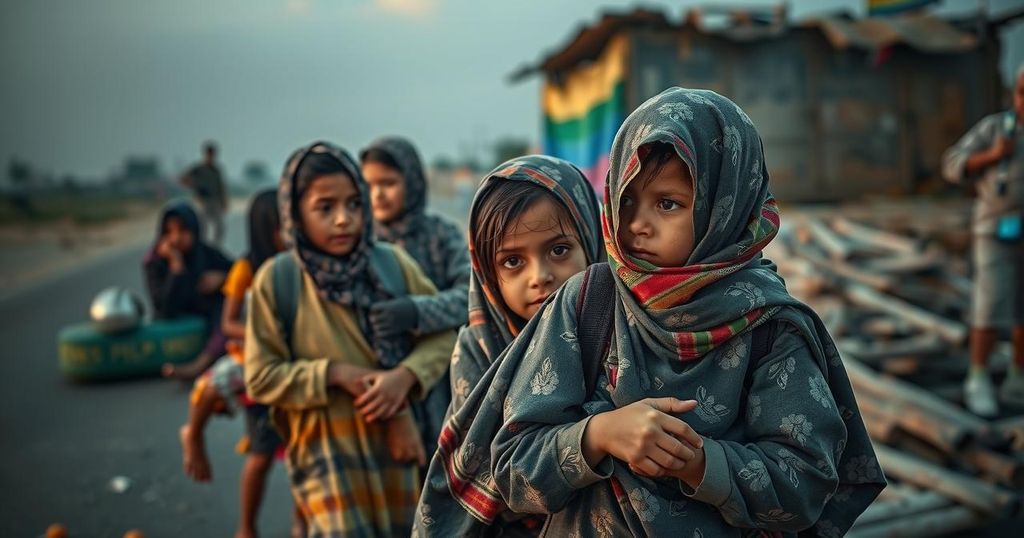The civil war in Sudan has led to a humanitarian crisis affecting millions, particularly children. Nearly five million children, including orphans like Mahmoud, face extreme hunger and displacement. Despite this invisible crisis, the UN is making efforts to deliver aid, with over twenty-five million Sudanese requiring assistance. Local organizations emphasize the need for community cohesion to support recovery efforts.
In the midst of Sudan’s civil war, there exists a profound humanitarian crisis characterized by the mass displacement of children. Mahmoud, a resilient teenager, represents the tragic plight of nearly five million Sudanese children forced to flee their homes due to relentless violence. These children endure extreme hunger, with famine declared in certain regions, while the international community struggles to provide adequate aid to the affected population. The UN estimates that over half of Sudan’s population, approximately twenty-five million individuals, require immediate assistance.
The UN’s new humanitarian chief, Tom Fletcher, has chosen to spotlight the devastating situation in Sudan during his inaugural field mission. He has emphasized that the crisis, while often overlooked amidst global conflicts, is actively acknowledged by humanitarian workers on the ground. Many of these workers are Sudanese nationals who have lost their homes to the ongoing struggle between the army and the paramilitary Rapid Support Forces (RSF).
Mahmoud, now living in a makeshift orphanage in Kassala, south of Khartoum, was initially displaced from his home when fighting erupted. Despite the dire circumstances, he dreams of rebuilding his country, showcasing the resilience of Sudan’s youth. However, for the eleven million displaced Sudanese, survival presents daily challenges, as food access remains critically limited.
Following discussions with military leaders, the UN has received permission to expand their aid delivery efforts, a significant step considering the challenges posed by the warring factions. The World Food Programme has been striving to access isolated communities in need, including regions where famine has been officially recognized.
Amid the tumult, the humanitarian community faces criticism regarding their operations, particularly regarding the complexities of working with the ruling military regime. Nonetheless, Mr. Fletcher remains committed to negotiating necessary arrangements to deliver aid effectively, advocating for prioritizing the needs of the affected populace over bureaucratic challenges.
As reported, sexual violence has erupted as an alarming epidemic in the war, forcing the UN to mark a global campaign against gender-based violence. During his visit, Mr. Fletcher emphasized the necessity for improved conditions and actions to assist affected women and children, urging cooperation among the Sudanese in mobilizing aid efforts. The dedication of local groups like Shamaa, which provides support and refuge for abused women and orphans, highlights the endurance and compassion of the Sudanese amid their profound struggles.
In conclusion, the ongoing conflict in Sudan has resulted in unprecedented humanitarian challenges, particularly affecting children and vulnerable populations. As international organizations continue to rally support and negotiate for greater aid access, it is crucial to recognize the resilience and agency of the Sudanese people as they confront their current hardships. The road to recovery and rebuilding their lives lies ahead but remains fraught with challenges requiring urgent and sustained international attention.
The ongoing civil war in Sudan has created a dire humanitarian crisis, displacing millions and leading to widespread famine. The conflict primarily stems from a power struggle between the Sudanese Army and the paramilitary Rapid Support Forces, which has exacerbated the suffering of countless citizens, particularly children. As international attention frequently shifts to conflicts in Gaza and Ukraine, Sudanese children find themselves in unimaginable circumstances, struggling for survival amid widespread hunger and violence. Many humanitarian organizations, including the UN, are mobilizing to provide support, but bureaucratic and logistical obstacles continue to hinder relief efforts.
The situation in Sudan represents one of the most urgent humanitarian crises in the world today, marked by the displacement of millions, especially children. International recognition of the plight is crucial, but it must be accompanied by actionable support that prioritizes the needs of those suffering. As highlighted by representatives and local aid workers, cooperation among Sudanese people and organizations remains vital for overcoming these profound challenges, aiming to restore dignity and hope amid a landscape of despair.
Original Source: www.bbc.co.uk







